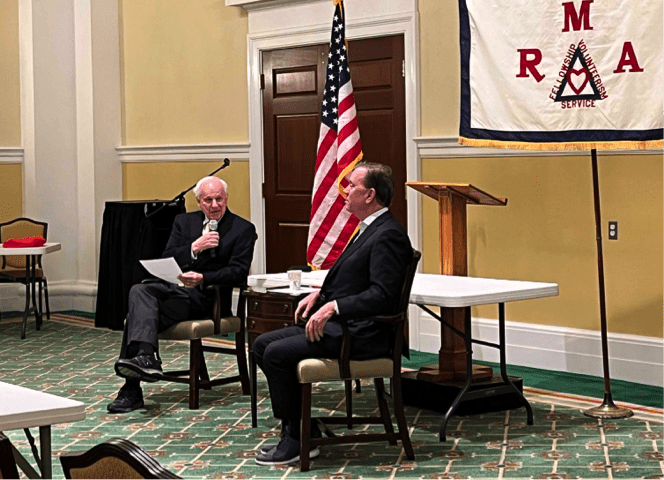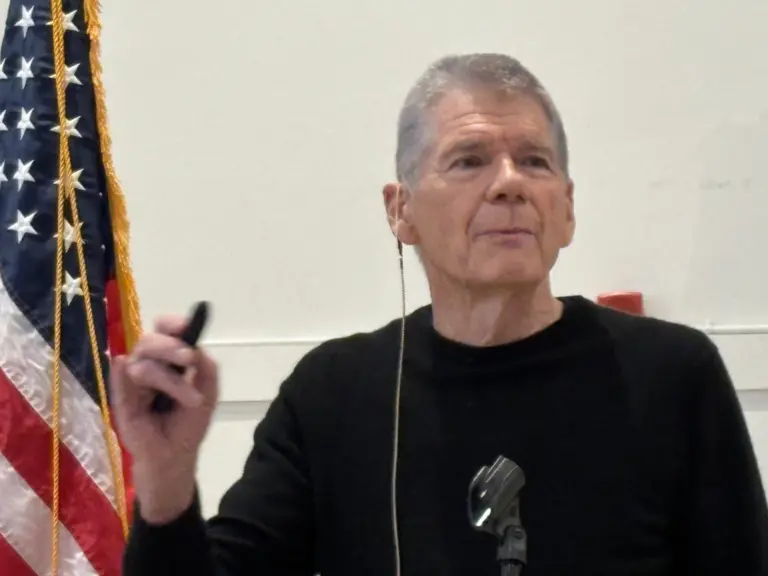
By Joe Angland
At the Retired Men’s Association of Greenwich’s meeting on Wednesday, March 9, State Representative Steve Meskers introduced Governor Ned Lamont commending the Governor for what he has done for the state in terms of revitalizing the economy and guiding it through the Covid crisis. Governor Lamont returned the compliment, explaining that in addition to fighting vigorously for Old Greenwich, Steve had proven particularly effective in Hartford because of his ability to work across the aisle and bring people together.
In his opening comments, Governor Lamont noted that it was two years to the day since he had raced to Danbury in response to the state’s first reported Covid infection. He recalled that his initial reaction to the appearance of the pandemic in Connecticut was to ensure that hospitals did not get overwhelmed, as happened in some other places. He also recalled the challenge of balancing the need for protecting against the virus and the importance of keeping certain critical functions such as manufacturing and outdoor construction going. He acknowledged that the state was hard hit by the initial wave of Covid but noted that Connecticut was now the most vaccinated and least infected state.
The Governor also recalled that one of his earliest priorities was to get the state’s fiscal house in order. He noted that the state had achieved three straight years of budget surpluses and that it had done so without increasing taxes. He observed that he had often said “you don’t need more taxes, but I want more taxpayers.” To that end, he had worked to make the state more attractive to businesses and individuals. He mentioned the reduction of taxes on real property, cars, and 401(k) withdrawals, as well as programs that incentivized businesses to pay off student loans of their employees. The Governor emphasized that when he assumed office he changed the approach to recruiting businesses. Rather than the traditional, defensive approach of offering tax abatement to businesses that moved in, he emphasized the state’s highly skilled work force and enlisted businesses that have been in the state for a long time to sing its praises to prospective newcomers.
Governor Lamont noted that the economy had recovered so well that one of the key problems now that there were about 100,000 jobs that employers could not fill. To address that issue the state is ascertaining the nature of the jobs that are open today and will likely be open within the next few years, and it is offering free training, which benefits both the trainees and companies that will hire them.
The Governor was then interviewed by Hollister Sturges, who began by discussing the war in Ukraine. The Governor said that the state was open to welcoming some Ukrainian refugees, as it had refugees from Afghanistan. He said that most of the Afghan refugees settled with either immediate family or distant relatives, and he expected that the same would be true for refugees from Ukraine.
Governor Lamont said that he agreed with President Biden’s decision to stop oil purchases from Russia, noting that “you’re not serious about sanctioning Russia unless you’re sanctioning oil and gas.” He recognized that the greatest impact of the Ukrainian war on the state would be felt at the gas pump, and he said that he is exploring a reduction in the gasoline tax as a short-term offset to that problem.
Hollister asked the Governor about the state’s ranking 46th in a CNBC ranking of states’ attractiveness to business, and the Governor noted that that was a ranking several years ago, and that we had moved up 15 places in a short period of time. A large factor in this improvement was the surpluses run in the last three years, which led to the state’s having a large rainy-day fund which helps ensure the financial stability that is so important to businesses. Informed by how slowly the state had reacted at times when he was a businessman, he had also worked hard to speed up some of the state’s dealings with businesses. The Governor concluded that the wind is now at our back when it comes to attracting businesses. Speaking of wind, Governor Lamont said that Connecticut is ideally situated to develop wind power because of the fairly constant wind levels several miles off shore.
In response to questions about infrastructure, Governor Lamont noted that the state will receive about $1 billion per year for five years as a result of federal legislation (with an obligation to match about 20-30% of that amount with state funds). He said that he hoped to cut fifteen to twenty minutes off the commute from Stamford to both New York City and New Haven in about five years, both for trains and cars. With respect to trains, he noted that old bridges that force trains to slow down were a specific problem to be remedied. As for cars, he said that the solution was not generally adding more lanes, but dealing with specific choke points that caused delays. Another infrastructure need he is addressing is moving power substations out of flood zones, something that is especially critical now that “100-year storms” come about every twenty years.
The Governor then responded to questions from the audience. He endorsed the exemption from State statute 8-30g’s affordable housing provisions for cities and towns that have a good five-or-ten-year plan to meet or approach the 10% statutory target within several years. He believed that localities should have flexibility to figure out how best to get to the target. When asked “where do tolls stand,” the Governor bluntly said “nowhere.” He acknowledged that the idea of imposing tolls had not been popular, even though half of the money they would have raised would have come from out-of-state vehicles that use our roads for free. He noted that given the absence of tolls a fee had been imposed on the largest tractor-trailers that use our roads.
Governor Lamont also mentioned an initiative to reduce the number of illegal guns in the hands of juveniles. He said that all too often what once would have been a fist-fight would now turn into a gun fight. The focus of the initiative will be on the gun traffickers that bring the guns to the state.
Those interested in listening to the entire discussion with the Governor may stream it at https://vimeo.com/686500120
The RMA’s next presentation will be on March 23 with Robert Henrey, Lecturer on historical encounters between the West and Asian culture and former international tax and financial consultant. His informative presentation will be about ”China 1981” and his reflections on China and just how much in 1980 the world was about to change due to China’s embrace of modernity as a result of Mao Zedong’s death in 1976. To stream this informative presentation at 11AM on Wednesday, March 23, click https://bit.ly/30IBj21. This presentation will also be available on the local public access TV Channels, Verizon FIOS channel 24 and Optimum (Cablevision) channel 79.
RMA speaker presentations are presented as a community service at no cost to in-person or Zoom attendees. The RMA does request that all eligible individuals consider becoming a member of our great organization, and thereby enjoy all the available fellowship, volunteer and community service opportunities that the RMA offers to its members. For further information, visit www.greenwichrma.org or contact Michael Ambrosino (mailto:brooklynoil@yahoo.com) or Peter Stern (mailto:pmstern@optonline.net.




